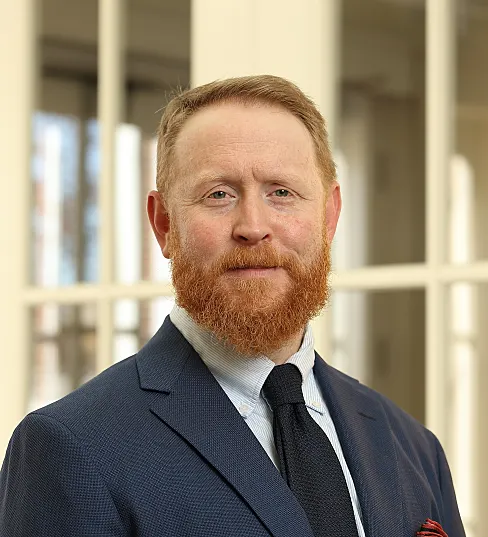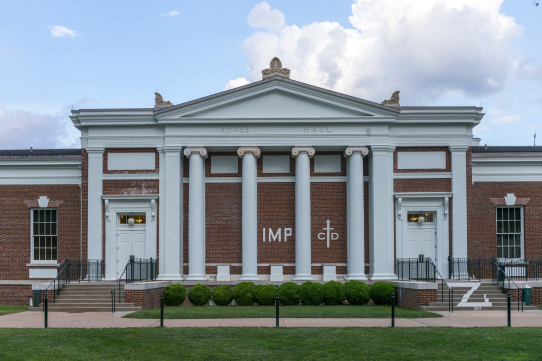New Pan-University Real Estate Minor Promises Engaging Pathways for Students

Drew Sanderford is the Robert M. White Jr. Bicentennial Professor of Real Estate Finance in the McIntire School of Commerce at the University of Virginia. Professor Sanderford introduces a new minor degree available to students interested in real estate. He and his colleagues are welcoming the first cohort of these students this spring.
Real estate and the political, financial, economic, design, and engineering of cities have been on the minds of UVA students and faculty for quite some time. Formal coursework in real estate has evolved since Professor George Overstreet began offering a class in real estate finance in 1984. Today, there are several avenues within the University for students to pursue an interest in real estate. There are real estate electives at Darden and in the Law School. Students can earn a graduate certificate in Real Estate + Design and Development from the School of Architecture. Undergraduate students at McIntire can take the Real Estate Track, and Engineering students can earn a credential in Construction Engineering. The newest real estate credential on Grounds is the Real Estate Minor, which was approved by the Faculty Senate in the spring of 2021 and will officially welcome its first cohort of students in spring 2022.

The Real Estate Minor is a pan-University collaboration between the McIntire School of Commerce, the School of Architecture, and the School of Engineering and Applied Science. Administrated by McIntire, the minor creates a pathway (and credential) for undergraduate students from across Grounds to engage in the multidimensional study of real estate.
The 15-credit curriculum has a three-course core that introduces students to fundamental concepts in markets, finance, and land-use law. Because real estate is a compound discipline, this core helps students to acquire the foundational argumentative languages used across the practice. Further, where real estate markets and related political processes shape the spaces in which we live, work, and create the future in profound ways, these foundational classes also challenge students to confront market and policy failures. In addition to the core courses, students may choose from an array of electives that help them to sharpen their skills, expand their curiosity, or dig deeper into a related topic important to them.
When my colleagues and I were thinking through the program design, I asked myself what electives I would take if I could return as an undergraduate and work through the minor. Looking across the tremendous array of courses offered by the UVA faculty, and constraining myself to undergraduate courses only, I, personally, would take “From Redlined to Subprime: Race and Real Estate in the U.S.” from Professor Andrew Kahrl in the Department of History. I would also take “Business Ethics” from Professor Charles Mathewes in the Department of Religious Studies. Both scholars engage in complex and thoughtful research that they bring into the classroom to create two incredible offerings germane to the markets of today and tomorrow. However, that’s just me. Students can explore construction engineering, urban design, affordable housing, advanced finance, urban sociology, political economy, and other topics that they believe will help them grow as reflective practitioners. My colleagues and I are excited to learn from the students where they see important questions and opportunities.
 The real estate minor reflects the hard work of and collaborative debate among colleagues from different disciplinary perspectives, with different training, and with different experiences working in the space. It also reflects the leadership of and from current and prior Deans at McIntire, the School of Architecture, and the School of Engineering and Applied Science. We thank our incredibly supportive alumni for their time and talent as well. We would not have arrived at this place without all those who contributed, asked questions, or urged us onward. Thanks to all who helped.
The real estate minor reflects the hard work of and collaborative debate among colleagues from different disciplinary perspectives, with different training, and with different experiences working in the space. It also reflects the leadership of and from current and prior Deans at McIntire, the School of Architecture, and the School of Engineering and Applied Science. We thank our incredibly supportive alumni for their time and talent as well. We would not have arrived at this place without all those who contributed, asked questions, or urged us onward. Thanks to all who helped.
- Having a Drink With Your Donkey: The Absurd in Antiquity
- What Happens to UVA’s Recycling? A Behind the Scenes Look at Recycling, Composting, and Reuse on Grounds
- Finding Your Center: Using Values Clarification to Navigate Stress
- UVA Club of Atlanta: Virtual Pilates Class
- UVA Club of Fairfield/Westchester: Cavs Care - Food Pantry Donation Drive
- UVA Club of Charlottesville: ACC Football Championship Game Watch